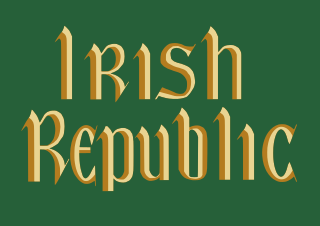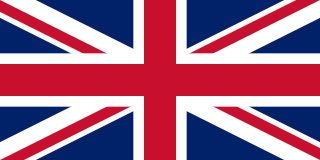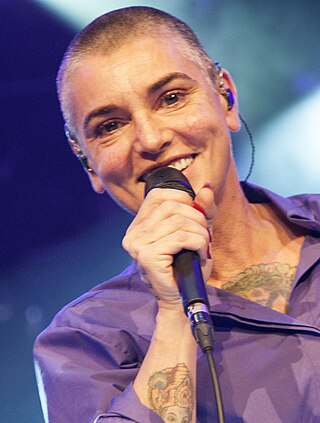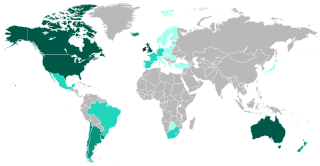
Belfast is the capital and largest city of Northern Ireland, standing on the banks of the River Lagan on the east coast. It is the 10th-largest primary urban area in the United Kingdom and the second-largest city in the island of Ireland. Belfast City had a population of 293,298 in 2021. The population of its metropolitan area was 671,559 in 2011, and the Belfast Local Government District had a population 345,418 in 2021.

Dublin is the capital and largest city of Ireland. On a bay at the mouth of the River Liffey, it is in the province of Leinster, bordered on the south by the Dublin Mountains, a part of the Wicklow Mountains range. At the 2022 census, the municipal area had a population of 592,713, while Dublin City and its suburbs had a population of 1,263,219, and County Dublin had a population of 1,458,154.

Ireland, also known as the Republic of Ireland, is a country in north-western Europe consisting of 26 of the 32 counties of the island of Ireland. The capital and largest city is Dublin, on the eastern side of the island. Around 2.1 million of the country's population of 5.15 million people reside in the Greater Dublin Area. The sovereign state shares its only land border with Northern Ireland, which is part of the United Kingdom. It is otherwise surrounded by the Atlantic Ocean, with the Celtic Sea to the south, St George's Channel to the south-east, and the Irish Sea to the east. It is a unitary, parliamentary republic. The legislature, the Oireachtas, consists of a lower house, Dáil Éireann; an upper house, Seanad Éireann; and an elected President who serves as the largely ceremonial head of state, but with some important powers and duties. The head of government is the Taoiseach, who is elected by the Dáil and appointed by the President; the Taoiseach in turn appoints other government ministers.

The Great Famine, also known within Ireland as the Great Hunger or simply the Famine and outside Ireland as the Irish Potato Famine, was a period of starvation and disease in Ireland lasting from 1845 to 1852 that constituted a historical social crisis and subsequently had a major impact on Irish society and history as a whole. The most severely affected areas were in the western and southern parts of Ireland—where the Irish language was dominant—and hence the period was contemporaneously known in Irish as an Drochshaol, which literally translates to "the bad life" and loosely translates to "the hard times". The worst year of the famine was 1847, which became known as "Black '47". During the Great Hunger, roughly 1 million people died and more than 1 million more fled the country, causing the country's population to fall by 20–25% between 1841 and 1871. Between 1845 and 1855, at least 2.1 million people left Ireland, primarily on packet ships but also on steamboats and barques—one of the greatest exoduses from a single island in history.

Northern Ireland is a part of the United Kingdom in the north-east of the island of Ireland that is variously described as a country, province or region. Northern Ireland shares an open border to the south and west with the Republic of Ireland. At the 2021 census, its population was 1,903,100, making up around 3% of the UK's population and 27% of the population on the island of Ireland. The Northern Ireland Assembly, established by the Northern Ireland Act 1998, holds responsibility for a range of devolved policy matters, while other areas are reserved for the UK Government. The government of Northern Ireland cooperates with the government of Ireland in several areas under the terms of the Belfast Agreement. The Republic of Ireland also has a consultative role on non-devolved governmental matters through the British–Irish Governmental Conference (BIIG).

The Provisional Irish Republican Army, officially known as the Irish Republican Army and informally known as the Provos, was an Irish republican paramilitary force that sought to end British rule in Northern Ireland, facilitate Irish reunification and bring about an independent republic encompassing all of Ireland. It was the most active republican paramilitary group during the Troubles. It saw itself as the army of the all-island Irish Republic and as the sole legitimate successor to the original IRA from the Irish War of Independence. It was designated a terrorist organisation in the United Kingdom and an unlawful organisation in the Republic of Ireland, both of whose authority it rejected.

Sinn Féin is an Irish republican and democratic socialist political party in both the Republic of Ireland and Northern Ireland.

The Troubles were an ethno-nationalist conflict in Northern Ireland that lasted for about 30 years from the late 1960s to 1998. Also known internationally as the Northern Ireland conflict, it is sometimes described as an "irregular war" or "low-level war". The conflict began in the late 1960s and is usually deemed to have ended with the Good Friday Agreement of 1998. Although the Troubles mostly took place in Northern Ireland, at times violence spilled over into parts of the Republic of Ireland, England, and mainland Europe.

The United Kingdom of Great Britain and Northern Ireland, commonly known as the United Kingdom (UK) or Britain, is a country in Northwestern Europe, off the north-western coast of the continental mainland. It comprises England, Scotland, Wales, and Northern Ireland. It includes the island of Great Britain, the north-eastern part of the island of Ireland, and most of the smaller islands within the British Isles. Northern Ireland shares a land border with the Republic of Ireland; otherwise, the United Kingdom is surrounded by the Atlantic Ocean, the North Sea, the English Channel, the Celtic Sea, and the Irish Sea. The total area of the United Kingdom is 94,060 square miles (243,610 km2), with an estimated 2022 population of nearly 67 million people.

William John Neeson is an actor from Northern Ireland. He has received several accolades, including nominations for an Academy Award, a BAFTA Award, three Golden Globe Awards, and two Tony Awards. In 2020, he was placed seventh on The Irish Times list of Ireland's 50 Greatest Film Actors. Neeson was appointed Officer of the Order of the British Empire (OBE) in 2000.

Sinéad Marie Bernadette O'Connorshin-AYD was an Irish singer, songwriter, and activist. Her debut studio album, The Lion and the Cobra, was released in 1987 and achieved international chart success. Her 1990 album, I Do Not Want What I Haven't Got, was her biggest commercial success, selling over seven million copies worldwide. Its lead single, "Nothing Compares 2 U", was honoured as the top world single of the year at the Billboard Music Awards.

Ireland is an island in the North Atlantic Ocean, in north-western Europe. It is separated from Great Britain to its east by the North Channel, the Irish Sea, and St George's Channel. Ireland is the second-largest island of the British Isles, the third-largest in Europe, and the twentieth-largest in the world.

The Irish War of Independence or Anglo-Irish War was a guerrilla war fought in Ireland from 1919 to 1921 between the Irish Republican Army and British forces: the British Army, along with the quasi-military Royal Irish Constabulary (RIC) and its paramilitary forces the Auxiliaries and Ulster Special Constabulary (USC). It was part of the Irish revolutionary period.

The Republic of Ireland men's national football team represents the Republic of Ireland in men's international football. It is governed by the Football Association of Ireland (FAI).

Irish people are an ethnic group and nation native to the island of Ireland, who share a common ancestry, history and culture. There have been humans in Ireland for about 33,000 years, and it has been continually inhabited for more than 10,000 years. For most of Ireland's recorded history, the Irish have been primarily a Gaelic people. From the 9th century, small numbers of Vikings settled in Ireland, becoming the Norse-Gaels. Anglo-Normans also conquered parts of Ireland in the 12th century, while England's 16th/17th century conquest and colonisation of Ireland brought many English and Lowland Scots to parts of the island, especially the north. Today, Ireland is made up of the Republic of Ireland and Northern Ireland. The people of Northern Ireland hold various national identities including British, Irish, Northern Irish or some combination thereof.

The Irish Republican Army (IRA) is a name used by various paramilitary organisations in Ireland throughout the 20th and 21st centuries. Organisations by this name have been dedicated to anti-imperialism through Irish republicanism, the belief that all of Ireland should be an independent republic free from British rule.

Cork is the second largest city in the Republic of Ireland, third largest on the island of Ireland, and largest in the province of Munster. At the 2022 census, it had a population of 222,526.

Since 1922, the United Kingdom has been made up of four countries: England, Scotland, Wales and Northern Ireland. The UK Prime Minister's website has used the phrase "countries within a country" to describe the United Kingdom. Some statistical summaries, such as those for the twelve NUTS 1 regions of the UK, refer to Northern Ireland, Scotland, and Wales as "regions". With regard to Northern Ireland, Scotland and Wales particularly, the descriptive name one uses "can be controversial, with the choice often revealing one's political preferences".

Irish, or Gaelic, also sometimes known outside Ireland as Irish Gaelic, is a Goidelic language of the Insular Celtic branch of the Celtic language family, which is a part of the Indo-European language family. Irish is indigenous to the island of Ireland and was the population's first language until the 19th century, when English gradually became dominant, particularly in the last decades of the century. Today, Irish is still commonly spoken as a first language in areas of Ireland collectively known as the Gaeltacht, in which only 2% of Ireland's population lived in 2016. It is also spoken by a larger group of habitual but non-traditional speakers, mostly in urban areas where the majority are second-language speakers. From 2006 to 2008, over 22,000 Irish Americans reported speaking Irish as their first language at home, with several times that number claiming "some knowledge" of the language.

The Good Friday Agreement (GFA) or Belfast Agreement is a pair of agreements signed on 10 April 1998 that ended most of the violence of the Troubles, an ethno-nationalist conflict in Northern Ireland that had prevailed since the late 1960s. It was a major development in the Northern Ireland peace process of the 1990s. It is made up of the Multi-Party Agreement between most of Northern Ireland's political parties, and the British–Irish Agreement between the British and Irish governments. Northern Ireland's present devolved system of government is based on the agreement.



















